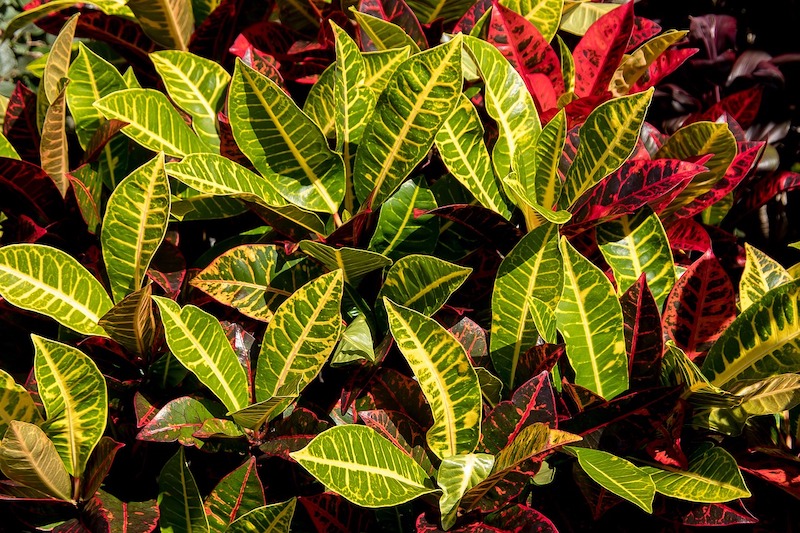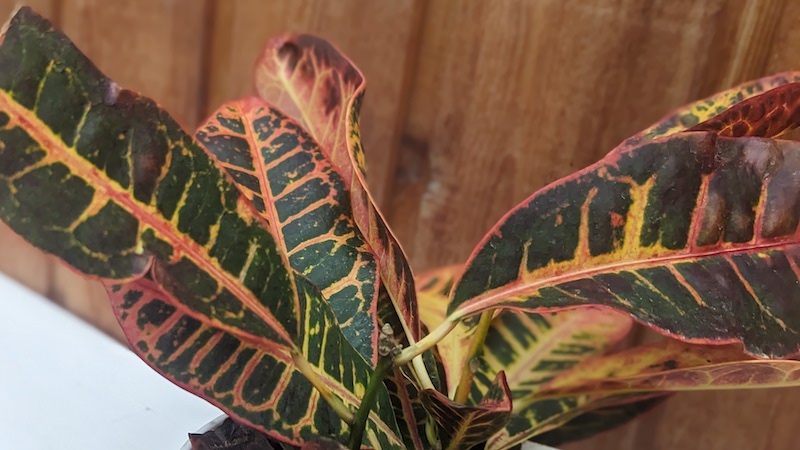Crotons are tropical houseplants that rely on fertilizing to maintain colorful, vibrant foliage. Croton grows quickly during the spring and summer months, using up high amounts of micro and macronutrients in the soil. When grown in a container, Croton will need regular fertilizing while it is actively growing to look its best.

Why Fertilize Croton
Fertilizing enhances the vivid colors of croton’s foliage. Croton especially depends on the macronutrients nitrogen, phosphorous, and potassium (NPK) for strong foliage growth, cell formation, and strong root growth. Regular watering leaches nutrients from the soil, and these need to be replaced for croton to continue to thrive. In the late fall and winter months, croton slows its growth, so fertilizing during this time is unnecessary.
How Often To Fertilize Croton
Croton growing indoors should be fertilized on a regular schedule from March to September. The frequency of fertilizing depends on whether you will be using a liquid formulation or a granular slow-release type of food. Diluted liquid fertilizers act quickly and should be applied once every 3-4 weeks at half the strength recommended by the manufacturer. When fertilizing, avoid wetting the leaves as this can burn the foliage.
Slow-release granular fertilizers feed a plant a little every time it is watered. Apply these feeds about three times a growing season: once in early spring, again in the summer 8 weeks later in the summer, and finally an additional 8 weeks later in late summer. Add the fertilizer to the top one inch of potting mix.
How To Tell If Croton Needs Fertilizer
Underfed croton plants may appear dull instead of shiny and may grow slowly or not at all. Keep in mind a lack of color may also be due to insufficient light exposure, and sunlight deficiency should be considered which should be addressed before adding fertilizer. Crotons prefer to grow in slightly acidic soil and can show signs of micronutrient deficiency if the soil becomes too alkaline. Grow croton in a potting mix formulated for acid-loving plants to ensure the best growth.

Best Fertilizer For Croton
Choose a fertilizer with an NPK ratio of either 8-2-10 or 3-1-2. Both formulations will support dense foliage growth and strong root growth. Dr. Earth organic fertilizers are OMRI (Organic Materials Research Institute) certified and widely available. The Exotic Palm, Tropical, and Hibiscus fertilizer is a water-soluble formula that is easy to mix and use. Osmocote Plus, Indoor and Outdoor Plant Food is a good extended-release option for continuous feeding at every watering.
Croton Fertilizing Tips
Croton requires more feeding than most houseplants and should be fertilized on a regular schedule to keep it thriving and growing at its best.
- Only fertilize in March to September while it is actively growing
- Liquid feeds or granular slow-release formulas are equally effective
- Look for an NPK ratio of 8-2-10 or 3-1-2
- Use a potting mix intended for acid-loving plants when transplanting or repotting croton
Warnings
-Always wear protective gloves and a face mask when handling chemical fertilizers.
-Closely follow all directions and storage guidelines that are on the fertilizer label.
 |
Author Robbin Small - Published 10-22-2023 |
